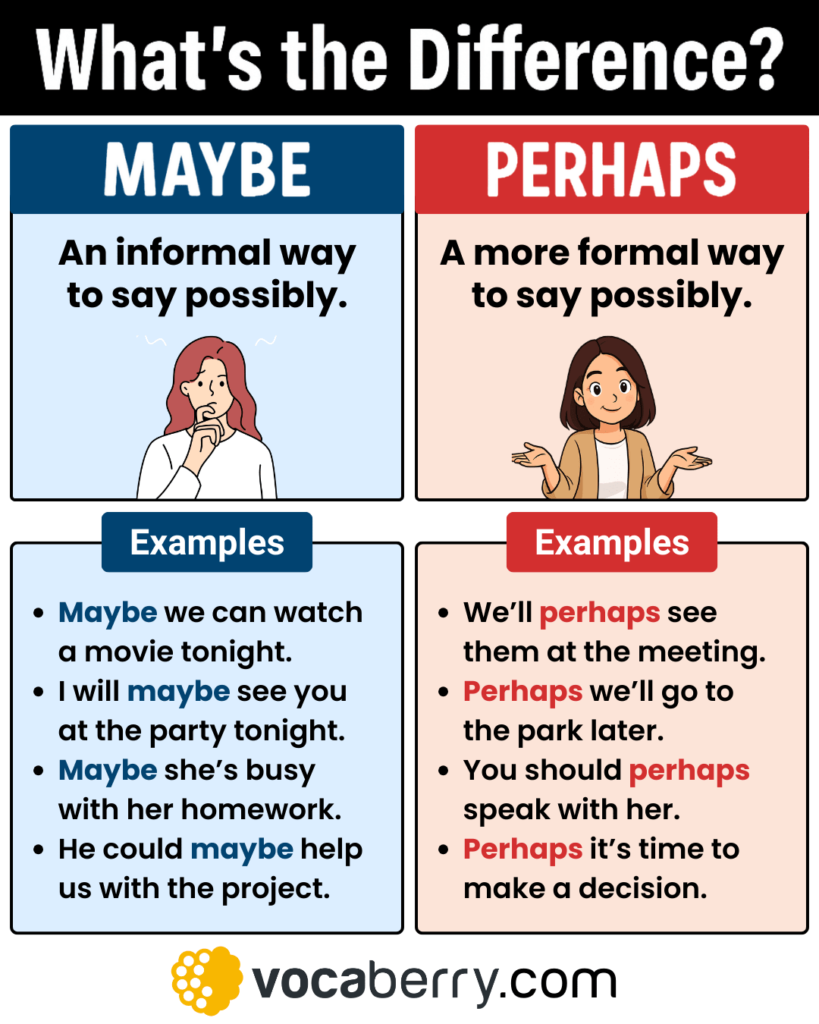
Maybe and perhaps both mean that something is possible, but they differ in formality and usage. Maybe is more informal and common in everyday conversation, while perhaps is slightly more formal and often used in writing or polite speech.
In this article, you’ll learn the difference between maybe and perhaps, with clear definitions and examples to help you use each word correctly.
What Does “Maybe” Mean?
Maybe is an adverb that means possibly or perhaps. It’s often used in informal speech and writing to show uncertainty or suggest that something could happen. Common in everyday English, maybe usually appears at the beginning of a sentence but can also be placed in the middle for emphasis.
Examples:
- Maybe you should try restarting the computer.
- Maybe it will rain later.
- I’ll maybe go to the gym after work.
What Does “Perhaps” Mean?
Perhaps is an adverb that means possibly or maybe. It is generally considered more formal than maybe and is common in written English, polite conversation, and professional contexts. It can appear at the beginning of a sentence to introduce an idea or in the middle to soften a statement or suggestion.
Examples:
- Perhaps we should leave earlier to avoid traffic.
- She will, perhaps, join us for dinner.
- Perhaps you could explain the situation more clearly.
Differences Between Maybe and Perhaps
Maybe and perhaps both mean possibly, but maybe is less formal and more common in everyday conversation, especially in spoken English. Perhaps is more formal and is often used in writing, polite speech, or formal situations. While they can be used in similar positions in a sentence, maybe is typical in casual contexts, and perhaps tends to sound more refined or cautious.
Example Sentences Using Maybe and Perhaps
Let’s look at more sentence examples to see how these words are used.
Example Sentences with Maybe
- Maybe we can go for a walk after dinner.
- I’m not sure if I can attend the meeting; I’ll maybe join online.
- She said she might be late, so maybe we should wait a little longer.
- We should leave early; maybe there will be traffic.
- I can’t find my wallet. Maybe I left it in the car.
- He’ll maybe call you later to explain.
- I don’t feel like cooking tonight, so maybe we can order pizza.
- They decided to cancel the picnic; maybe it was the weather.
- It’s getting cloudy. Maybe it’s going to rain.
- We could maybe ask for more time to finish the project.
Example Sentences with Perhaps
- Perhaps we should consider a different approach.
- The weather looks bad, so perhaps the event will be postponed.
- You could perhaps help me carry these boxes.
- There’s not much time left; perhaps we should hurry.
- She perhaps misunderstood what you meant.
- This book is quite difficult; perhaps you’d prefer an easier one.
- They haven’t replied yet, so perhaps they didn’t see your email.
- I haven’t decided yet; perhaps I’ll take a short holiday.
- It’s a bit risky, but perhaps it’s worth trying.
- The results were surprising; perhaps our calculations were wrong.
FAQs About Maybe vs. Perhaps
Do “maybe” and “perhaps” mean the same thing?
Yes. Maybe and perhaps both mean “possibly” or “it might happen.” The main difference is in formality and style. Maybe is more informal and common in everyday speech, while perhaps is more formal and often used in writing or polite conversation.
Which is more formal: maybe or perhaps?
Perhaps is more formal than maybe. It is often used in professional writing, academic texts, or polite suggestions. Maybe is best for casual speech and friendly writing.
Can I use maybe and perhaps interchangeably?
In most situations, yes. However, choose maybe in casual settings and perhaps when you want to sound more formal or polite.
Is “maybe” an adverb or a noun?
In most uses, maybe is an adverb meaning “possibly.” It can also be a noun meaning “something that is uncertain,” as in “It’s a maybe, not a yes.”
Is “perhaps” old-fashioned?
No. While perhaps can sound formal, it is still common in modern English. It appears often in newspapers, formal speeches, and polite conversation.
Can “perhaps” be used in the middle of a sentence?
Yes. Perhaps can go at the start or in the middle of a sentence. Example: The solution is perhaps easier than we thought.
Is “maybe” only used at the beginning of a sentence?
No. Maybe is often at the beginning but can also appear mid-sentence. Example: “Maybe she will come” or “I’ll maybe see you tomorrow.”
Which is more common in British and American English?
Both are used in British and American English. Maybe is more common overall, especially in conversation. Perhaps is more frequent in British English writing than in American English.
Can I use “maybe” in formal writing?
It’s better to use perhaps in formal writing because it sounds more professional and polite. However, maybe is not grammatically wrong.






